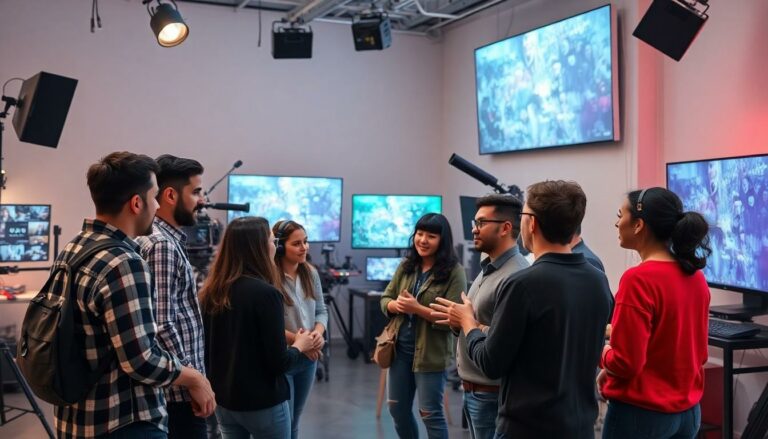
Entertainment Operations: Master Project Management & Platforms in Media-Based Entertainment
In a world where binge-watching has become a competitive sport, understanding entertainment operations is crucial. From managing complex projects to navigating the maze of platforms, it’s like herding cats—if those cats were also talented filmmakers, actors, and tech wizards. The right project management strategies can make or break a media-based venture, transforming chaos into captivating content that keeps audiences glued to their screens.
Entertainment Operations: Project Management and Platforms in Media-based Entertainment Read Online
Understanding entertainment operations requires recognizing the complexities involved in media-based projects. Project management in this field demands meticulous coordination among filmmakers, actors, and technical teams. Each stakeholder plays a crucial role in transforming innovative ideas into successful productions.
Various platforms contribute to the evolving landscape of media entertainment. Streaming services, social media, and traditional broadcasters interact dynamically, influencing how content reaches audiences. Effective project management strategies not only facilitate collaboration but also streamline workflows, ensuring timely deliveries of high-quality content.
In herding diverse talents, leaders must prioritize communication and transparency. Clear channels create a shared vision that aligns the entire team toward common goals. Scheduling tools and collaboration software further enhance coordination, allowing teams to track progress and adjust plans as necessary.
Successful entertainment operations leverage data analytics to gauge audience preferences. Gathering insights on viewership patterns and engagement rates informs content development strategies. This data-driven approach helps projects resonate with viewers, driving higher retention and engagement levels.
Navigating intellectual property rights and compliance is another critical aspect. Adhering to regulations safeguards creative products and fosters trust among collaborators. Upholding these standards protects the integrity of the media industry, allowing it to thrive amidst rapid technological advancements.
Ultimately, proficient management of entertainment operations leads to captivating content that meets the demands of an increasingly sophisticated audience. Prioritizing adaptability and strategic planning becomes imperative in delivering engaging experiences in today’s media landscape.
Project Management in Media-Based Entertainment

Project management plays a crucial role in the media-based entertainment industry. Effective strategies enable the coordination of diverse talents toward creating captivating content.
Key Principles of Project Management
Communication stands at the forefront of project management. Clear dialogue among teams aids in aligning individual contributions towards shared objectives. Prioritization of tasks ensures that critical milestones are met, enabling timelines to stay intact. Flexibility is essential; adjustments may occur as projects unfold, necessitating a responsive approach. Collaboration fosters creativity, allowing different perspectives to enrich the final product. Lastly, accountability among team members guarantees that responsibilities are understood and executed, ensuring a smooth workflow.
Tools and Techniques Used
Project managers utilize various tools to streamline processes. Scheduling software assists in maintaining timelines and visualizing project phases. Communication platforms enhance real-time interaction, reducing delays caused by misunderstandings. Data analytics tools offer insights into audience behavior, guiding content strategies effectively. Collaboration applications support document sharing, making it easy for teams to access essential resources. Additionally, task management systems help assign responsibilities, track progress, and ensure adherence to deadlines. Using these tools promotes efficiency, enhancing the overall project outcome in media-based entertainment.
Platforms in Media-Based Entertainment
Platforms in media-based entertainment serve as essential conduits for reaching audiences. These systems facilitate the delivery of diverse content, encompassing films, television shows, music, and more.
Popular Platforms and Their Features
Streaming services like Netflix, Hulu, and Amazon Prime dominate the media landscape. Each platform offers unique features. Netflix emphasizes original content and personalized recommendations, while Hulu provides next-day access to current TV shows. Amazon Prime integrates various shopping features, providing significant value with its entertainment offerings. Social media platforms, such as YouTube and TikTok, enable user-generated content and community engagement, allowing creators to monetize their work.
Integration of Project Management with Platforms
Effective project management tools enhance collaboration within these platforms. Utilizing scheduling software streamlines project timelines, while communication applications improve team connectivity. Task management systems ensure accountability by tracking progress against deadlines. Data analytics tools offer insights into user engagement, helping teams make informed decisions about content creation. Proficient integration enables creative teams to harness the strengths of each platform, aligning their efforts toward delivering captivating content for audiences.
Challenges in Entertainment Operations
Entertainment operations face various challenges in managing projects and platforms effectively. These obstacles can hinder production quality and timeline adherence.
Common Issues Faced
Complex project management often leads to confusion among team members. Miscommunication results in missed deadlines and uncoordinated efforts. Additionally, navigating conflicting priorities among various stakeholders creates tension. Intellectual property rights pose risks, as differing interpretations can lead to legal complications. Keeping up with rapidly changing technology also challenges teams as they try to leverage new tools and platforms effectively.
Strategies for Overcoming Challenges
Effective communication serves as the cornerstone of successful entertainment operations. Implementing regular updates and feedback loops keeps all team members aligned. Prioritizing tasks helps in managing resources better, enabling teams to focus on critical elements first. Utilizing project management software optimizes workflows, allowing for easier tracking of progress. Ensuring continuous training on technology and compliance fosters confidence and adaptability within teams, which ultimately leads to enhanced production outcomes.
Future Trends in Entertainment Operations
Emerging technologies will reshape entertainment operations significantly. Artificial intelligence plays a critical role in content creation and audience analysis, allowing creators to tailor experiences with precision. Data analytics tools improve decision-making, providing insights into viewer preferences and behaviors.
Sustainability is gaining traction in production practices. Companies increasingly prioritize eco-friendly solutions, focusing on reducing waste and minimizing carbon footprints. Incorporating green initiatives enhances brand reputations and appeals to environmentally conscious audiences.
Collaboration tools continue to evolve. Remote work opportunities expand, enabling distributed teams to connect seamlessly. Cloud-based platforms facilitate real-time collaboration and project management, improving efficiency across diverse teams.
Social media influence grows, transforming content distribution. Platforms such as TikTok and Instagram foster dynamic engagement, allowing creators to interact directly with audiences. This two-way communication not only builds brand loyalty but also informs content strategies.
Virtual and augmented reality technologies emerge as key components of immersive storytelling. These innovations create unique experiences, drawing in audiences seeking more interactive formats. Many businesses explore opportunities to integrate VR and AR into their projects, setting a new standard for audience engagement.
Adapting to these trends requires flexibility and foresight. Leaders must focus on continuous learning to stay ahead in a rapidly evolving industry. Embracing change ensures organizations remain competitive while meeting the demands of an increasingly sophisticated audience.
Diverse Platforms
Navigating the landscape of entertainment operations requires a blend of strategic project management and an understanding of diverse platforms. As the media industry evolves, the ability to adapt to emerging technologies and audience preferences becomes crucial for success.
Leaders must foster collaboration and maintain clear communication among their teams to tackle the complexities of project management effectively. By leveraging the right tools and prioritizing flexibility, they can streamline workflows and enhance content delivery.
With the rise of innovative trends such as AI and immersive technologies, staying ahead of the curve is essential. Embracing these changes will not only improve production outcomes but also create captivating experiences that resonate with today’s audiences.



